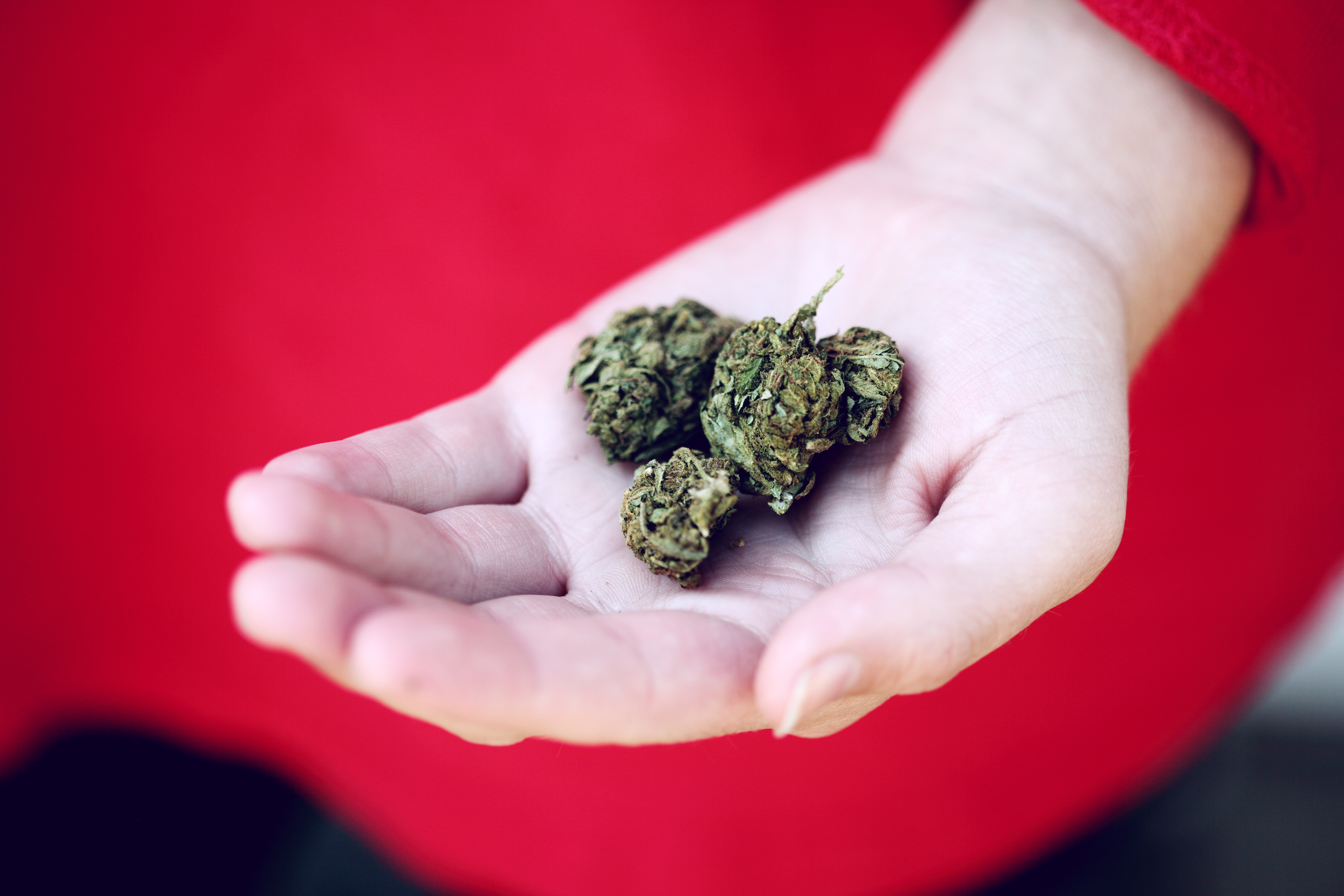Don’t let big tobacco take over cannabis
As cannabis users gather to celebrate 4/20, there is rising fear that corporate profiteering will destroy weed’s homegrown ethos.
It’s early spring, the sun is shining, birds are singing and blooms of daffodils line the Royal Parks. But on this particular morning in Hyde Park, London, there’s one flower loved by millions whose scent is billowing into the air in a defiant haze: Cannabis - marking the arrival of 4/20, the annual global celebration of weed and weed culture
On any other day, most of the tens of thousands of people lighting up a spliff, sharing a bong and switching on their vapes would be fined at the very least, or thrown in prison for up to six years. But despite the fact that this activity remains very definitely illegal (without a prescription), last year police officially said for the first time they would no longer arrest people at the 4/20 event.
This is largely thanks to one volunteer: Marwan Elgamal, who, like millions of others, owes his wellbeing to cannabis.
“I initially got involved in cannabis because I suffered a quite horrible injury where I snapped all four ligaments in my left knee,” says Marwan. “I was suffering with chronic pain, I had nine surgeries, the opioid medication was turning me into a zombie. So I decided to try cannabis and it worked phenomenally, with none of the side effects of opioids.”
Elgamal soon started meeting a lot of self-medicating patients in the cannabis space and realised nobody was bothering to speak up for these people in need.
“I saw 4/20 as an untapped opportunity to instigate change, so I just put my flag in the ground and started opening up conversations with the Royal Parks and the police.”
For Marwan and many others, this event is not just an excuse to get publicly stoned with the hope of no repercussions; it’s an opportunity to educate the public on the fundamentals of cannabis they're not privy toAnd that’s not just for those who aren’t familiar with cannabis - it’s regular users too.
“People who use cannabis in the UK have been so marginalised by the law they often don’t realise they’re using cannabis as a medicine, rather than recreationally, or that it’s even available legally on prescription and they might be eligible.” Says Marwan.
“Celebrating 4/20 in this more organised way not only provides a safe haven for these people to express their comforts, but a platform to deepen their understanding and relationship with the plant.”
This year, alongside Marwan’s new young persons' mental health support brand Buddy High and CBD company Green Machine, there’s a whole host of legal cannabis clinics, pharmacies and even a cannabis prescribing doctor on site. While this will undoubtedly help open up awareness of and access to legal medical cannabis in the UK, the very notion of this form of legal market, inevitably led by profits, is strongly opposed by some.
Medical cannabis has been legally available on prescription in the UK since 2018 (although more often than not at a cost too high for patients to afford) and the fight for full legalisation and wider access continues. However, there are fears among the community that “legalising” cannabis, instead of decriminalising or democratising, will prioritise the commercialisation of cannabis, while keeping cannabis out of the hands of the people, leaving cannabis seeds and growing your own illegal.
Cannabis Industry Thought Leader, Elizabetta Faenza explains:
“We need to stop the movement I've seen pushed for in many places, including in Germany, where adult use interests brings about a commercial model that denies the individual their rights to own and grow their own plants and product.”
Like Faenza, most people at the heart of cannabis advocacy and activism, who take part in acts of civil disobedience like 4/20, do so with patient safety in mind, and freedom to use and grow what is now proven to be a remarkable and safe plant medicine.
“If there’s one thing I absolutely detest it’s the commodification of cannabis,” says Faenza. “That doesn’t mean there shouldn’t be a medical cannabis system - before anything else we need to improve the medical cannabis access process, so that GPs can prescribe and maybe initially all those who have chronic or serious conditions are get that product subsidised or free, and ensure there’s better education throughout system for both physicians and patients.
"Once we’ve moved through that, we can push for decriminalisation, which is the next step towards democratisation: personal ownership and usage of the plant, through to cannabis club models like they have in Spain. This will slow down the ‘money-grab’ I've seen all across the world in many jurisdictions that really undermines the plant's holistic value and turns it into a commodity.”
Faenza believes decriminalisation will probably come first in the UK. It's not a great solution, but it does remove the horrific penalties that are applied unjustly inequitably towards vulnerable minority populations.
“Ultimately, I think democratisation is the way to go. This is a plant that offers so many benefits in so many ways, from the individual and communities, to the economy to health.”
But as the adult use market - regulated sale of cannabis to users above a certain age, similarly to alcohol - Big Tobacco is swooping in, to the detriment of freedom, human health, and the fate of our planet. Tobacco giant, Altria Group, have recently bought up a 45% stake in Canadian cannabinoid company, Cronos Group for approximately $1.8 billion, while British tobacco company, Imperial Brands, has heavily invested in cannabinoid focused biopharmaceutical company and another Canadian cannabis company who develop cannabis products for the wellness and recreational markets. There’s huge money to be made here, once again at the people’s expense.
Co-operative community, Liberate Hemp, has launched an ‘Overgrow the Regime’ movement to shine a light on hemp licensing not being fit for purpose as it is stifling the “green economy”, British farming and public health.
“We’re calling for an end to the industrial hemp licensing regime. Everyone should be able to grow hemp freely” says Liberate Hemp campaigner, Zena Winterbottom.
“The licensing regime has no public benefit and it should be scrapped. If the government fails to act then we will have no choice but to come together to grow hemp without their permission”
This may seem extreme, and according to current legislation, it is illegal, just like the majority of cannabis use at Hyde Park 4/20.
But Zena is adamant:“We encourage everyone to grow hemp plants regardless of whether or not they have obtained a license.” she says. “Our world is not in a position to wait. There is a huge amount of potential to salvage for a greener economy, public health & UK farming. We believe it demands mass civil disobedience.”

Marwan Elgamal (second left) at the annual 4/20 event in Hyde Park, London, April 2023.
For Marwan and many others, this event is not just an excuse to get publicly stoned with the hope of no repercussions; it’s an opportunity to educate the public on the fundamentals of cannabis they're not privy toAnd that’s not just for those who aren’t familiar with cannabis - it’s regular users too.
“People who use cannabis in the UK have been so marginalised by the law they often don’t realise they’re using cannabis as a medicine, rather than recreationally, or that it’s even available legally on prescription and they might be eligible.” Says Marwan.
“Celebrating 4/20 in this more organised way not only provides a safe haven for these people to express their comforts, but a platform to deepen their understanding and relationship with the plant.”
This year, alongside Marwan’s new young persons' mental health support brand Buddy High and CBD company Green Machine, there’s a whole host of legal cannabis clinics, pharmacies and even a cannabis prescribing doctor on site. While this will undoubtedly help open up awareness of and access to legal medical cannabis in the UK, the very notion of this form of legal market, inevitably led by profits, is strongly opposed by some.
Medical cannabis has been legally available on prescription in the UK since 2018 (although more often than not at a cost too high for patients to afford) and the fight for full legalisation and wider access continues. However, there are fears among the community that “legalising” cannabis, instead of decriminalising or democratising, will prioritise the commercialisation of cannabis, while keeping cannabis out of the hands of the people, leaving cannabis seeds and growing your own illegal.
Cannabis Industry Thought Leader, Elizabetta Faenza explains:
“We need to stop the movement I've seen pushed for in many places, including in Germany, where adult use interests brings about a commercial model that denies the individual their rights to own and grow their own plants and product.”

Rapper Big Narstie hangs out with Margie, 19, who uses medically available marijuana to alleviate a number of symptoms. Hyde Park, London, April 2023 (Photo: Channelle Joseph)
Like Faenza, most people at the heart of cannabis advocacy and activism, who take part in acts of civil disobedience like 4/20, do so with patient safety in mind, and freedom to use and grow what is now proven to be a remarkable and safe plant medicine.
“If there’s one thing I absolutely detest it’s the commodification of cannabis,” says Faenza. “That doesn’t mean there shouldn’t be a medical cannabis system - before anything else we need to improve the medical cannabis access process, so that GPs can prescribe and maybe initially all those who have chronic or serious conditions are get that product subsidised or free, and ensure there’s better education throughout system for both physicians and patients.
"Once we’ve moved through that, we can push for decriminalisation, which is the next step towards democratisation: personal ownership and usage of the plant, through to cannabis club models like they have in Spain. This will slow down the ‘money-grab’ I've seen all across the world in many jurisdictions that really undermines the plant's holistic value and turns it into a commodity.”
Faenza believes decriminalisation will probably come first in the UK. It's not a great solution, but it does remove the horrific penalties that are applied unjustly inequitably towards vulnerable minority populations.
“Ultimately, I think democratisation is the way to go. This is a plant that offers so many benefits in so many ways, from the individual and communities, to the economy to health.”
But as the adult use market (the regulated sale of cannabis to users above a certain age, similarly to alcohol) grows, Big Tobacco is swooping in - to the detriment of freedom, human health, and the fate of our planet. Tobacco giant, Altria Group, have recently bought up a 45% stake in Canadian cannabinoid company, Cronos Group for approximately $1.8 billion, while a British tobacco company, Imperial Brands, has heavily invested in cannabinoid focused biopharmaceutical company and another Canadian cannabis company who develop cannabis products for the wellness and recreational markets. There’s huge money to be made here, and at the people’s expense.
Co-operative community, Liberate Hemp, has launched an ‘Overgrow the Regime’ movement to shine a light on hemp licensing not being fit for purpose as it is stifling the “green economy”, British farming and public health.
“We’re calling for an end to the industrial hemp licensing regime. Everyone should be able to grow hemp freely” says Liberate Hemp campaigner, Zena Winterbottom.
“The licensing regime has no public benefit and it should be scrapped. If the government fails to act then we will have no choice but to come together to grow hemp without their permission”
This may seem extreme, and according to current legislation, it is illegal, just like the majority of cannabis use at Hyde Park 4/20.
But Zena is adamant. “We encourage everyone to grow hemp plants regardless of whether or not they have obtained a license.” she says. “Our world is not in a position to wait. There is a huge amount of potential to salvage for a greener economy, public health & UK farming. We believe it demands mass civil disobedience.”
The Lead is now on Substack.
Become a Member, and get our most groundbreaking content first. Become a Founder, and join the newsroom’s internal conversation - meet the writers, the editors and more.





